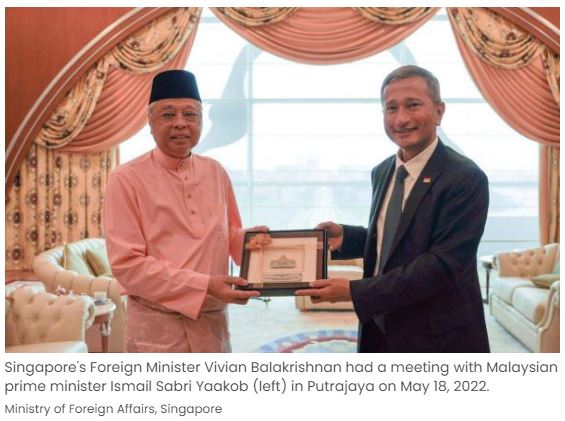Malaysia exploring ‘new ideas’ for terminated high-speed rail project with Singapore: Vivian
MALAYSIA is exploring “some new ideas” for a potential high-speed rail (HSR) project to link Kuala Lumpur and Singapore, with the Republic waiting to receive these proposals, said Singapore’s Foreign Minister Vivian Balakrishnan on Thursday (May 19).
The original HSR project was officially terminated in January 2021, after both countries failed to reach an agreement on changes proposed by Malaysia by the deadline of Dec 31, 2020. Malaysia later paid more than S$102 million in compensation to Singapore as a result.
“We will examine their proposals with a fresh pair of eyes on a clean slate,” said Dr Balakrishnan in an interview with Singapore reporters in Kuala Lumpur to wrap up his 3-day visit to the Malaysian capital.
“Let us wait and see what emerges, but again the key point here is connectivity and opportunities to collaborate, opportunities to invest, (and) opportunities to do more together,” he added.
As far as air travel between the 2 neighbours are concerned, the minister shared that there are now about 180 flights a week from Singapore to 7 destinations across Malaysia. This, he said, is only at about 40 per cent of the pre-pandemic flight connectivity.
“Before the pandemic, we had about 500 flights a week. We hope in the next few weeks and months, to see a full resumption of air connectivity,” he said.
For the land borders, he expressed confidence that the flow of traffic at the Causeway and Second Link will increase over time to get closer to pre-pandemic levels. Before Covid-19 struck, there were around 350,000 people who commuted daily between Singapore and Malaysia using the Causeway.
He noted that one of the plans to improve connectivity is via a ferry service from Tanah Merah in Singapore to the newly-opened Desaru Coast ferry terminal in Johor. “I think that is a matter of undergoing the necessary regulatory checks and approvals,” he said.
That ferry terminal has a Customs, Immigration and Quarantine Complex with the capability to handle 300 passengers at a time.
During the interview, Balakrishnan also said that the Johor-Singapore Rapid Transit System (RTS) has made “good progress”, with construction in Singapore is “well underway” for the station.
“This will improve land connectivity between Johor and Singapore in quite a transformative way. We are looking forward to, hopefully, the establishment of full passenger services by the end of 2026,” he said.
The RTS will be able to carry 10,000 people per hour, each direction, or absorb at least 35 per cent of the traffic at the Causeway once it begins operations according to earlier news reports.
Beyond connectivity via land, air and sea, Dr Balakrishnan said expanding business opportunities and people-to-people interactions, as well as new areas of collaboration such as high-tech agriculture and promotion of more cross-border investment, were some of the main highlights of his visit.
Asked to comment on Malaysia’s political uncertainties that could affect the bilateral relationship with Singapore, Dr Balakrishnan said that, since 2018, Malaysian politics has undergone a “challenging and complicated” time.
“There have been various reconfigurations of government in the past few years. But if we take a step back, and I again want to emphasise this, the strength of the bilateral relationship, the closeness of the interaction, if anything, has been strengthened, and the levels of trust increased by actual performance during the pandemic,” he said.
“The fact that we both worked together, we were able to support each other, that we came through for each other at critical moments, made all the difference. In terms of the bilateral political relationship, it is strong, it is close, we are dependable, we are reliable.”
Source: https://www.businesstimes.com.sg/asean-business/malaysia-exploring-new-ideas-for-terminated-high-speed-rail-project-with-singapore


 English
English




